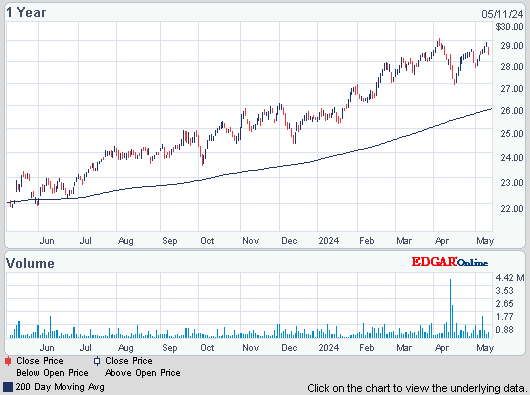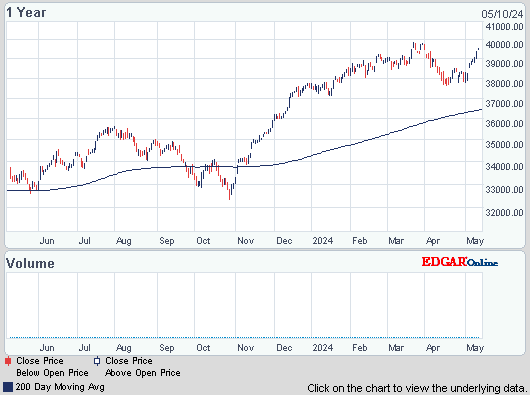Dow lost 68, decliners over advancers 4-3 & NAZ added 12. The MLP index fell 3+ to 453s & the REIT index was down 1 to the 267s. Junk bond funds were mixed to lower & Treasuries retreated with the yield on the 10 year Treasury back at 3%. Oil fell to
the lowest level in 6 weeks after a gov report showed
bigger-than-expected gains in supplies
as demand dropped. Gold also lost ground.
AMJ (Alerian MLP Index tracking fund)

![Live 24 hours gold chart [Kitco Inc.]](http://www.kitco.com/images/live/gold.gif)

Photo: Bloomberg
The oil boom in the US has put European refineries out of business & undercut West African crude suppliers. Now domestic drillers threaten to roil Asian markets & challenge producers in the Middle East & South America. 15 European refineries have closed in the past 5 years, with a 16th due to shut this year, the International Energy Agency (IEA) said, as the US went from depending on fuel from Europe to being a major exporter to the region. Nigeria, which used to send the equivalent of a dozen supertankers of crude a month to the US, now ships fewer than 3 as cheap oil from the Rocky Mountains, where output has grown 31% since 2011, will soon allow West Coast companies to cut back on imports of pricier grades from Saudi Arabia & Venezuela that they process for customers in Asia, the world’s fastest-growing market. With US exports of gasoline & other refined products hitting a record last month & the country on pace to become the world’s largest oil producer by 2015, 5 years faster than the IEA’s earlier predictions, industry advocates are calling for an end to 39-year-old restrictions on US crude exports. Advances in extracting oil from shale rock drove a 39% jump in US production since 2011, the steepest rise in history, & will boost output to a 28-year high this year. While drilling in shale is more expensive than other methods & poses environmental challenges, the prospect of a growing supply is encouraging analysts to predict a more energy-independent nation. The country is so flush with crude that imports are plunging & drillers are challenging export limits imposed after the 1973 Arab oil embargo.
China's new credit probably fell by a record in H2 amid a crackdown on speculative lending, limiting prospects for economic expansion this year as policy makers focus on controlling financial risks. The broadest measure of aggregate financing was 7.1T yuan ($1.2T) based on published figures plus estimates. That would be about 931B yuan less than in H2-2012, the largest drop in figures going back to 2002. The leaders are set to be tested in their willingness to sacrifice economic growth to tame a record debt buildup that’s evoked comparisons to Japan before its lost decade. China’s economy probably grew 7.6% in 2013, the State Council said last month. That would tie 1999’s pace as the lowest since 1990 & be just above the 7.5% growth goal for the year. Analysts see a 7.4% expansion in 2014. China’s cabinet, led by Premier Li Keqiang, has imposed new controls on the multi-trillion-dollar shadow-banking industry with an order that targets off-the-books loans & shores up enforcement of current rules. Last week, the National Audit Office reported that local-gov debt including contingent liabilities swelled to a record 17.9T yuan as of Jun. Shadow financing poses risks both to the system as a whole & to individual lenders & borrowers.
China Record Credit Hole Seen Limiting Growth Prospects: Economy
Stocks wrapped up the first week (5 trading days) lower as the Dow fell 114 in the first week. This is the 2nd measure for those who watch early returns to predict the year's performance (the first test is the first day). The last test uses Jan's performance which has the makings of another decliner. The Dow has had a spectacular performance, nearly doubling from 2008 year end, with an almost straight up run. Treasuries are already weak, reflecting higher interest rates. Higher interest will be a negative for the stock market because many investors have gotten used to low interest rates & fear a rise in interest rates (to their historical levels).
Dow Jones Industrials

AMJ (Alerian MLP Index tracking fund)
Treasury yields:
U.S. 3-month |
0.04% | |
U.S. 2-year |
0.42% | |
U.S. 10-year |
2.99% |
| CLG14.NYM | ....Crude Oil Feb 14 | ....92.50 | (1.3%) |
![Live 24 hours gold chart [Kitco Inc.]](http://www.kitco.com/images/live/gold.gif)

As Federal Reserve
top officials debated their decision to scale back a massive bond-buying
stimulus program last month, they wanted to steer a delicate path. Minutes of the Dec
17-18 meeting showed many members wanted to proceed with
caution in trimming the asset purchases, & most wanted to stress that
further reductions were not on a preset course. The central bank ultimately
surprised many investors by deciding at the meeting to cut monthly purchases by
$10B, which is still an
aggressive effort to clear the way for investment, hiring & economic
growth. Some of the 10
policymakers "expressed concern about the potential for an unintended
tightening of financial conditions if a reduction in the pace of asset
purchases was misinterpreted as signaling that the committee was likely
to withdraw policy accommodation more quickly than had been
anticipated," the minutes said. "As a consequence, many members
judged that the committee should proceed cautiously in taking its first
action to reduce the pace of asset purchases and should indicate that
further reductions would be undertaken in measured steps." They also wanted to stress to
the public that further reductions were "not on a preset course" &
would depend on progress in the labor market & on inflation, as well
as on how well the program was judged to work in the months ahead. Most members were confident
enough in the labor market outlook that they viewed scaling back the
program as appropriate.
The oil boom in the US has put European refineries out of business & undercut West African crude suppliers. Now domestic drillers threaten to roil Asian markets & challenge producers in the Middle East & South America. 15 European refineries have closed in the past 5 years, with a 16th due to shut this year, the International Energy Agency (IEA) said, as the US went from depending on fuel from Europe to being a major exporter to the region. Nigeria, which used to send the equivalent of a dozen supertankers of crude a month to the US, now ships fewer than 3 as cheap oil from the Rocky Mountains, where output has grown 31% since 2011, will soon allow West Coast companies to cut back on imports of pricier grades from Saudi Arabia & Venezuela that they process for customers in Asia, the world’s fastest-growing market. With US exports of gasoline & other refined products hitting a record last month & the country on pace to become the world’s largest oil producer by 2015, 5 years faster than the IEA’s earlier predictions, industry advocates are calling for an end to 39-year-old restrictions on US crude exports. Advances in extracting oil from shale rock drove a 39% jump in US production since 2011, the steepest rise in history, & will boost output to a 28-year high this year. While drilling in shale is more expensive than other methods & poses environmental challenges, the prospect of a growing supply is encouraging analysts to predict a more energy-independent nation. The country is so flush with crude that imports are plunging & drillers are challenging export limits imposed after the 1973 Arab oil embargo.
China's new credit probably fell by a record in H2 amid a crackdown on speculative lending, limiting prospects for economic expansion this year as policy makers focus on controlling financial risks. The broadest measure of aggregate financing was 7.1T yuan ($1.2T) based on published figures plus estimates. That would be about 931B yuan less than in H2-2012, the largest drop in figures going back to 2002. The leaders are set to be tested in their willingness to sacrifice economic growth to tame a record debt buildup that’s evoked comparisons to Japan before its lost decade. China’s economy probably grew 7.6% in 2013, the State Council said last month. That would tie 1999’s pace as the lowest since 1990 & be just above the 7.5% growth goal for the year. Analysts see a 7.4% expansion in 2014. China’s cabinet, led by Premier Li Keqiang, has imposed new controls on the multi-trillion-dollar shadow-banking industry with an order that targets off-the-books loans & shores up enforcement of current rules. Last week, the National Audit Office reported that local-gov debt including contingent liabilities swelled to a record 17.9T yuan as of Jun. Shadow financing poses risks both to the system as a whole & to individual lenders & borrowers.
China Record Credit Hole Seen Limiting Growth Prospects: Economy
Stocks wrapped up the first week (5 trading days) lower as the Dow fell 114 in the first week. This is the 2nd measure for those who watch early returns to predict the year's performance (the first test is the first day). The last test uses Jan's performance which has the makings of another decliner. The Dow has had a spectacular performance, nearly doubling from 2008 year end, with an almost straight up run. Treasuries are already weak, reflecting higher interest rates. Higher interest will be a negative for the stock market because many investors have gotten used to low interest rates & fear a rise in interest rates (to their historical levels).
Dow Jones Industrials
I’m a huge fan of INO & from what I have seen so far, their service Marketclub! This isn’t a stripped down version, everything in MarketClub is available to you. I don’t want to give everything away, but you’ll have unlimited access to my favorite 3 tools: Trade Triangles, Smart Scan & Alerts! The best part is that the MarketClub customer support team will be providing UNLIMITED support! You can call or email for an instant response to any question, comment or concern.
Here’s that link:
https://club.ino.com/join/specialtrial/index_free.html?a_aid=CD3289&a_bid=359ef9a3
I’d recommend you jump on this now.









No comments:
Post a Comment